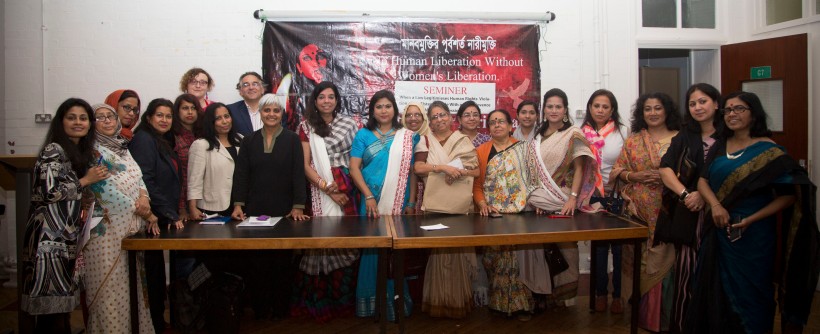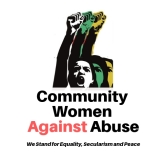• Community and Women’s Rights Organisations Condemned the Law Society’s Practice Note about Sharia Succession wills
• Solidarity to Reyhaneh Jabbari’s Family and Condemnation of Reyhaneh’s Execution

Women activists at Nari Diganta with the panelists and representatives of eight women’s organsiations at Montefiore Centrre on 15 Oct 2014. Courtesy: Diamond Studios
Seeking to achieve equal rights and a bigotry-free secular society in Britain, the secular Bengali women’s organisation, called the Nari Diganta – Women in Movement for Equal Rights, Social Justice and Secularism, has hosted a timely dialogue between the community activists and experts. The meeting, ‘When a Law Legitimises Violation of Human Rights of My Sister: Screening of Naree and Discussion about the Trouble with and Irrelevance of Sharia Succession Training in the UK’ was held on 15 October, at the Montefiore Centre in East London.

Shamima Hena, the Chairperson of Nari Diganta, thanked everybody on 15 Oct 2014. Courtesy: Golam Rabbani of the Diamond Studio
In a packed room, with an estimated 60 people of mixed backgrounds and with representatives from 15 organisations, the event kicks in by the screening of the film Naree –The Divine Stone by Hasan Mahmud. The screening was followed by a critical discussion about how religious law legitimises women’s oppression and promotes racism, sexism, patriarchy, and cultural relativism. A panel of three guest speakers and campaigners for secularism and human rights in Britain have discussed how the Law Society’s latest practice note about Sharia Succession wills can go against equality and secularism in Britain. They explored how this practice note of Law Society could violet human rights, and how non-Muslims and adopted children will be discriminated by Sharia Succession wills in UK.
The speakers who formed the panel include Advocate Sultana Kamal, Director of Ain o Salish Kendro, Bangladesh, Pragna Patel, Director of Southall Black Sisters, and Fariborz Pooya, Founder of Iranian Secular Society and Director of Bread and Roses TV. The event was co-ordinated and facilitated by Dr Rumana Hashem, Co-ordinator of the event and a founding member of Nari Diganta.

Part of the audience at Montefiore Centre on 15 Oct 2014. Courtesy: S Enam of Bangladesh Communist Party, UK.
The event was endorsed by several community organisations including AWAAZ, Jubo Union, Jago Naree, Naree Chetona, Network of Eritrean Women, and Udichi Shilpi Gosthi. Speakers and participants at the symposium said that Sharia Law is a bigoted law in which millions of women across the Muslim world have been oppressed, exploited and victimised. This law must not be introduced in the UK.
Advocate Sultana Kamal, the lead panelist has spoken about the situation in Bangladesh. She said, ‘Sharia is a codification of several laws and it discriminates women in particular.’ She said, ‘there is no such law called Sharia Law in today’s Bangladesh’. She said, ‘Bangladesh’s history shows also that there was no such law in ancient Bengal’. She argues that it is some fundamentalist men who introduced the Sharia Succession wills which discriminate women. In providing a historical background of the situation in Bangladesh, Sultana Kamal said, ‘there are too many versions of Sharia law’ and that ‘none of this can be proved as authentic’. She added, ‘While a whole lot of progress has been made by women in Bangladesh generally there are also lots of threats, insecurities and violence against women’. She said, ‘as social fabrics, political atmosphere in Bangladesh has become more conservative the state has become nervous and is unable to take bold steps in favour of women’.
Pragna Patel, the Director of Southall Black Sisters, explained the practice note of Law Society and identified its racist aspects. She explains that the LS’s guidance does not only discriminate Muslim women but also many men and children of other ethnicity. Patel said that despite its long-disputed and discriminatory aspects, the Law Society in the UK, which represents solicitors in England and Wales, issued a practice note with details of how to draft “Sharia compliant” wills. She argued, ‘if Muslims are allowed to follow Sharia then other groups such as Sikhs and Hindus will also follow this discriminatory law’. She stipulated, ‘state and religion cannot be mixed up. Religion is a private matter. State and religion must be separated’. Pragna Patel denounced that a secular state cannot have two laws in one state. ‘We want one law for all’, she said.
Fariborz Pooya, the Founder of Iranian Secular Society, said that he was surprised by seeing the banner of Nari Diganta which declared that there is ‘No Human Liberation Without Women’s Liberation’. He questioned the Law Society, and condemned them for not consulting the women who are to be subjects of discrimination by the Law Society’s practice note. He said that it is illegitimate to recommend any guidance for best practice without prior consultation with relevant people and the groups of women and men to whom this law would have jurisdiction. Pooya added, historical documents show that none of us have interpreted the versions of Sharia law. He questioned, ‘so who did interpret Sharia law’?
Gita Sahgal, the Founding Director of the Centre for Secular Space and a panelist who was unable to make the event physically, has sent a message of solidarity which Pragna Patel read out for the audience. In her message Sahgal noted, ‘the struggle for One Law for All is an important part of the secular struggle. It is essential to ensuring the rights of women. It is particularly important for minority women. In so many countries, where there are religion based personal laws, women are treated as inferior. They are not full citizens with the right to constitutional protection by the law. No-one wants to interfere with the minority. So women are left at the mercy of so called leaders, acting in the name of God.’
She notes further, ‘In Britain women from minorities have the same rights in theory but may not in practice. Illegal sharia councils are spreading. They claim to find solutions to women’s problems, and often provide divorces to women, especially those having a nikaah and not a registered marriage. As Pragna will no doubt explain the decisions of these councils are not legal. The pieces of paper they issue are worthless. Men posing as judges should be prosecuted. Yet they survive and are spreading with the tolerance and maybe encouragement of the authorities.’
Throughout the meeting speakers and participants explored discriminatory aspects of Sharia Law. Both participants and experts have agreed that the Law Society’s recommendations for cultural relativism and bigotry in Britain cannot be tolerated. One participant, who appeared as confused about the title of the meeting, was accused of being Jamat-e- Spy by the audiences. Participants and community activists have strongly protested her comments, and some have demanded her expulsion from the meeting. But the kind co-ordinator has disapproved this demand of the audience and handled the situation prudently. Dr Hashem said, in warning the participant, ‘I hope that you have got the answer to your comments and questions. Please be seated and do not try to interrupt others’.

Rumana Hashem and Sultana Kamal responded to the participant who was confused about the title of the meeting on 15 Oct 2014. Courtesy: Diamond Studios
Dr Hashem and the panelists have explained how a religious law does legitimise human rights violation of women. Sultana Kamal said, ‘what Rumana was saying is that Shariah Law has certain aspects which created spheres in which women are often victimised’. She and other panelists called upon the community representatives being present in the meeting to take a stand against such law. Pragna Patel said, ‘we need to understand that law and religion cannot be mixed up. […] Sharia Council is illegal in this country.[…] Sharia law discriminates women’. She called upon the participants to defend their human rights and said, ‘there will be street protests against Law Society’s practice note, please do come and join us’. The forum has accepted Patel’s call for protest and condemned the Law Society’s guidance. The facilitator, Rumana Hahsem, has confirmed that she will be keeping in touch with the campaigners for One Law for All, and will update the forum. She assured the forum that Nari Diganta will organise a follow up meeting in near future.
The meeting ended with a solidarity message to the family of an Iranian woman, Reyhaneh Jabbari, due to be put to death for killing a man she said was trying to sexually abuse her. In response to the call for solidarity by Fariborz Pooya, all participants in the meeting have waived their hands to express solidarity to Reyhaneh’s family. The forum condemned the execution. Rumana Hashem said, ‘we will soon be sending out a letter of condemnation from this forum to the Iranian Embassy’.
The event was opened by Nasima Kajol, the Secretary of Nari Diganta, by a welcoming speech and brought to an end by Shamima Hena, the Chairperson of Nari Diganta, with a vote of thanks. In her vote of thanks, Hena acknowledged that it is not only the women at Nari Diganta, who made this meeting happen but also a significant number of men have extended their support to Nari Diganta to take place this discussion at the Montefiori Centre. Both Hena and Hashem concluded by noting that this dialogue with community will continue and the campaign for a secular law and a secular state in Britain will be a success. ‘It is just a beginning of the campaign’, says Hena. The women at Nari Diganta are committed to work to resist the problematic practice note of the Law Society in the UK.
The organisers have acknowledged that Udichi Shilpi Goshti, the Rainbow Film Society and Diamond Studios have supported the event and provided with logistics and technical supports. Mustafa Kamal of Rainbow Society has expressed wish to assist with Nari Diganta’s future campaign work on secularism through his film society. The management of the Montefiore Centre has waived the fees for the venue for the extended time and have offered to hold future dialogues about this issue at the Montefiore Centre at free of cost. In commenting on this, Rumana Hashem said, ‘this shows that British Bangladeshis are not conservative, nor merely religious. They care for progressive, secular and bigotry-free society’.
Press release: Ansar Ahmed Ullah, Community Activist and Collaborative Partner of Nari Diganta.
Photo credits: Diamond Studios, Syed Enam and Paul Dudman




January 4, 2015 at 11:42 am
Nice Blog, thanks for sharing this kind of information.
LikeLike
Pingback: Dilemma of the Left: How to be Anti-acist, anti-War and yet critique Radical Islamism? | Informed Comment
Pingback: IHEU | Witnessing Horror in Father’s Dream Land: Tribute to a Believer in Free Speech
Pingback: Denounce Those Playing Political Games with Women’s Lives over Sharia and Islamophobia | Community Women's Blog